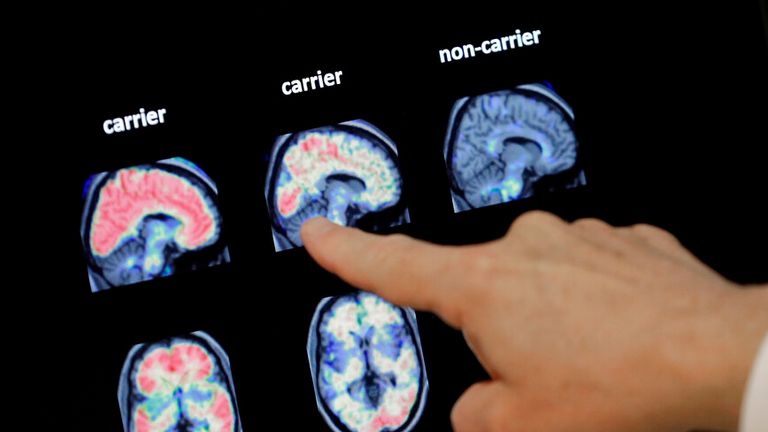What is frontotemporal dementia and how does it affect people?
Bruce Willis has been diagnosed with frontotemporal dementia, one of the rarer types of dementia.
His family said difficulties with communication are “just one of the challenges” the 67-year-old actor faces.
So what is frontotemporal dementia and what are people diagnosed with it likely to experience?
Frontotemporal dementia and its symptoms
Frontotemporal dementia (FTD) is thought to account for less than one in 20 of all dementia cases.
It is named for the parts of the brain it affects: the frontal and temporal lobes. It is sometimes called Pick’s disease or frontal lobe dementia.
There are different types of frontotemporal dementia. Behaviour variant FTD is the most common and mainly causes changes in someone’s personality and behaviour.
People with behavioural variant FTD may lose motivation; struggle to focus on tasks, make plans and decisions; lose their inhibitions; show repetitive behaviours and become less considerate of others.
The other main type of FTD is primary progressive aphasia (PPA) which has two sub-types: semantic variant PPA and non-fluent variant PPA.
Semantic variant PPA causes a person to forget the meaning of words.
The person is likely to lose their vocabulary over time and forget what familiar objects are used for.
Non-fluent variant PPA causes a person to have problems with speaking.
Over time, the person will find it more difficult to get their words out and may start to put words in the wrong order, miss out words and say the opposite of what they mean.
Last year, the Die Hard star retired from acting after being diagnosed with aphasia.
How is it different to other types of dementia?
The first noticeable symptoms of FTD are different to other types of dementia.
While people with Alzheimer’s disease often have early problems with day-to-day memory, many people in the early stages of FTD can still remember recent events.
By contrast, the early symptoms of FTD are changes to personality and behaviour and/or difficulties with language.
Who does it affect?
FTD typically affects people between the ages of 45 and 64 but can affect people younger or older than this.
How is it treated?
There’s currently no cure for frontotemporal dementia or any treatment that will slow it down, according to the NHS.
However, treatments such as medicines, therapies and memory activities can help control some of the symptoms.
Read more:
Celebrities send messages to ‘legend’ Bruce Willis
What is the outlook for people with FTD?
As FTD progresses, the differences between behavioural variant FTD and primary progressive aphasia become less obvious.
People who started with language difficulties often develop changes in their behaviour and vice versa.
People may eventually lose all speech.
The later stages of all types of FTD bring a greater range of symptoms, which are similar to the later stages of other types of dementia.
The person may become forgetful, have delusions or hallucinations, get agitated easily and no longer recognise family and friends. They may require full-time care.
How quickly FTD progresses and the person’s life expectancy will depend on the individual.
The average survival time after symptoms start is 8 to 10 years, according to the NHS.
How is FTD caused?
FTD is caused by damage to cells in areas of the brain called the frontal and temporal lobes.
There is a build up of proteins which clump together and damage the brain cells, eventually causing them to die.
It’s not fully understood why this happens, but there’s often a genetic link according to the NHS.
Around 1 in 8 people who get frontotemporal dementia will have relatives who also experienced the condition.
For all the latest entertainment News Click Here



